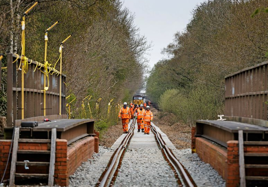“Then it went into a phase where suppliers saw nothing. Phase two was something of a disappointment. If you weren’t on the exemplars, the whole thing was a mystery to you.
“Now I think we are entering a third phase in which Network Rail has recognised there is a problem, and it is re-engaging with people on the outside.
“We are never short of an acronym or an initiative. We even have ‘agile clients’ now! In the past, the process triumphed over the outcome. You got a pat on the back for following the process, and didn’t get one for delivering the biggest bang for the buck. So, repositioning the mindset is a really important thing.”
“The commitment is to roll this out to enhancements and renewals,” says Christian Irwin.
“We treat maintenance in a different way. But renewals - ripping out track, replacing signalling, taking a bridge down and replacing it - can absolutely work this way.”
Inflation
Project Speed predates 2022’s double-digit inflation, the rocketing price of fuel, the war in Ukraine and this summer’s industrial action. Does that make it more relevant, or less?
“One of the key drivers of that industrial action is the affordability of the network,” says Irwin.
“If we can apply Speed to deliver projects quicker and cheaper, the cost of the railway should come down. We have to be more affordable.
“Inflation is probably our biggest risk. We buy a phenomenal amount of material, and the material prices are rising significantly. We have to deploy Speed through everything, because otherwise good plans will become unaffordable, and we can offset some of the challenges of inflation.
“We may see no success in the current climate.
“We talked about this more than anything else over the last quarter with the Department for Transport. How do we make decisions, when the cost of delivering things is increasing rapidly and the budget is not?
“Project Speed is all about being curious and willing to try something different. The railway hasn’t always been good at that.”














